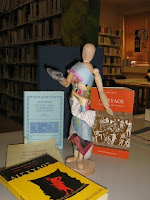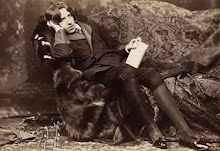
Well, if it isn't our own "Happy Prince"! Look what we found in our Local History archives. This is the statue of the ancient tragic poet Aeschylus... In 1977, he shone like gold . "He was gilded all over with thin leaves of fine gold" (actually it is bronze when polished) "Leaf after leaf of the fine gold the Swallow picked off, till theHappy Prince looked quite dull and grey", just like our statue 31 years after. (Photos from Elefsina, The Chronicle of a town, Elefsina Municipality Edition, 2007)

"Why, then didn't we tear it down?" I asked the bookclub members."What happened to his "gold"?" The answer was obvious. Aeschylus's gold was, is and will be the timeless dramas he bestowed to civilization, that shine through the centuries. The statue has been moved many times, but is a landmark in our town and we like to see it in the years to come. On the left, our library maskot disguised as Aeschylus, holding the tragedy mask, as the library members like to toy with it every once in a while...
Το άγαλμα του τραγικού μας ποιητή στέκει μετά από 31 χρόνια χωρίς την πρώτη λάμψη του στιλβωμένου μπρούτζου, αλλά σε αντίθεση με τον Ευτυχισμένο Πρίγκιπα του Όσκαρ Ουάιλντ, δεν αποσύρθηκε επειδή πήρε το χρώμα της μόλυνσης, γιατί το χρυσάφι που πρόσφερε όπως ο ήρωας του Ουάιλντ στον κόσμο είναι τα διαχρονικά του αριστουργήματα, Ορέστεια, Προμηθέας Δεσμώτης, Πέρσες, Επτά επί Θήβας, Ικέτιδες...δεξιά, τα μέλη της βιβλιοθήκης μεταμορφώνουν τη μασκώτ σε Αισχύλο...
The library users in the photo are part of the theatrical team that won the 3rd prize at the 2008 Hellenic Student Arts Contest for Aeschylus’s Iketides (Suppliants) directed by the headmaster of the 3rd Gymnasium of Elefsina, Mrs Aggeliki Levendi.
The girls have fond memor ies of the rehearsals and the play. Marianna says you forget everything once you’re on stage. Others said the theatre strengthened the bonds between them. They recited the verses they still remember: “Oh, thou mountainous land of Apia, take pity on me, if ever our foreign language you comprehend”
ies of the rehearsals and the play. Marianna says you forget everything once you’re on stage. Others said the theatre strengthened the bonds between them. They recited the verses they still remember: “Oh, thou mountainous land of Apia, take pity on me, if ever our foreign language you comprehend”
“Do not kill me, for I come from far away, hunted down by godless people”. These words can very well be the silent cry of contemporary refugees.
Τα παιδιά της φωτογραφίας που εργάζονται στη βιβλιοθήκη είναι μέρος της θεατρικής ομάδας του 3ου Γυμνασίου Ελευσίνας που τώρα φοιτούν στο λύκειο, που βραβεύτηκαν στους Πανελλήνιους Μαθητικούς Καλλιτεχνικούς Αγώνες 2008 για την ερμηνεία τους στις Ικέτιδες του Αισχύλου. Θυμήθηκαν εμπειρίες από το ανέβασμα του δράματος, την παρουσίασή του στα Αισχύλεια και στίχους όπως: «Ω, εσύ βουνίσια Άπια γη, λυπήσου με αν την ξενική λαλιά μας συ καταλαβαίνεις» και «Μη με σκοτώνεις την κατατρεγμένη, που από άθεους διωγμένη είμαι από μακριά φτασμένη». που ηχούν σα σιωπηλή κραυγή των προσφύγων όλου του κόσμου, τόσους αιώνες μετά τη συγγραφή τους…

























2 comments:
We could compare the heroes of the tragedies of Aeschylus, Pers and Dorian Gray, showing us the evolution of those who made their own vulnerability in the face of death and end crushed by their own illusion of an eternal life.
The subject is the story of the death of an empire and a civilization. A civilization reached, at the climax, but which stifle their fullness and richness, and has lost vital resources and refuse to see their own vulnerability. Aeschylus reveals his profound meanings, existential: terrible and unexpected defeat of the powerful Persian war machine, from Salamina, by a small Greek army not only brings the defeat of their ambitions of conquest of an empire, but the agony of a culture and a civilization that had its pride invincibility. Believing he is powerful, loving to himself as a god, with the belief that brought the dream of gold on the ground and refusing the right to livelihood of those who are not met, the man that civilizations have signed their own conviction to perish.
O, wonderful. I've seen something about to a blog of one of your students. Might be a honor to continue to play the Eschil stories.
congratulation for the theater team.
Post a Comment